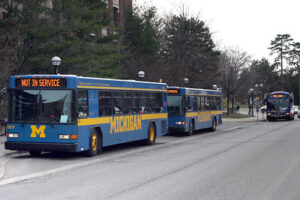Legislators introduced a package of bills today that would extend the Michigan Reconnect program to individuals twenty-one and older. Currently, the program is available only to people over the age of twenty-five. The goal is to get more people enrolled in college or trade programs. More than 90,000 Michiganders have taken advantage of the existing Michigan Reconnect program.
Despite the initial success of the program, Washtenaw Community College somehow managed to lose enrollment this year. So, what does it mean when you cannot give away your product?
That is what WCC’s declining enrollment means. There is a mechanism to fully fund the cost of attendance specifically for the demographic WCC is most interested in. Yet, that demographic’s interest is so minimal (at WCC) that the enrollment tanks.
I have no idea what the response would be to extending the Michigan Reconnect program benefits to 21-year-olds. But I do see a danger. Three years is not a terribly long wait. Extending free community college tuition to 21-year-olds could potentially entice recent high school graduates to “wait it out.” This is a problem because statistically, it is highly unlikely that people who take a three-year break from school will return to the classroom. It does happen, but more likely than not, high school graduates who “stop out” will never return to school.
In this way, extending the Michigan Reconnect program could potentially have the opposite of its intended effect. The enticement of free community college tuition could generate fewer – not more – college graduates in Michigan.
Michigan Reconnect isn’t the only way to pay for school
Regardless of what happens to these bills, community colleges should plan to remain firmly connected to high school graduates who do not enroll in college classes. It is especially important to let these students know that there are other ways to pay for college. The message must be that waiting three years to attend school is not necessary.
Community colleges like WCC also owe it to the community and to potential students to take a hard look at their academic programs. Evaluate all occupational and technical programs for their earning potentials. High demand for workers is not the best measurement of economic viability for a program. Of course, employer demand for low-wage workers will be high. The goal, however, should not be to quickly crank out minimally trained, minimally skilled workers.
The only thing that will draw students in is the certainty of making more money after graduation than they would have made by simply remaining in their jobs. Currently, community college degrees do not produce enough additional income (especially for men) to make going to school worthwhile.
When students stop enrolling, take a long, hard look at what you are offering them. If someone can make as much money without your degree as with one, you are doing something wrong.
Photo Credit: Ford Asia Pacific , via Flickr




















